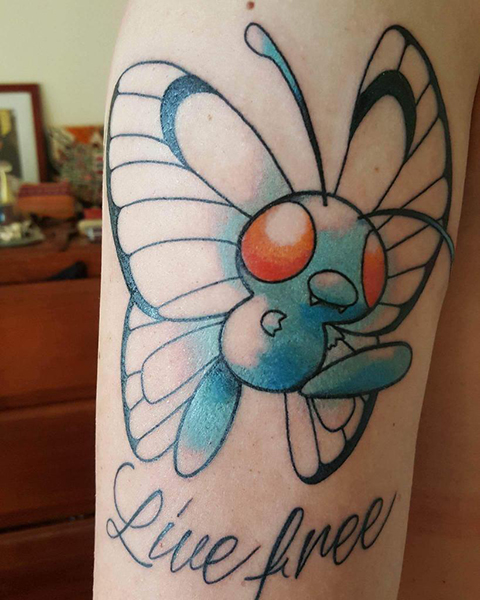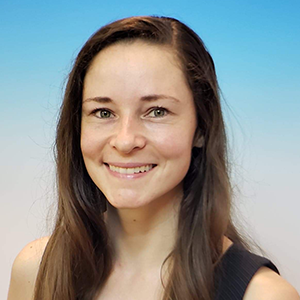
Travels with Chelsey
“Funnily enough … for whatever reason,” Chelsey once told me, when she played Pokémon as a kid, the character Butterfree was always on her team.
Chelsey and I took the train to Sydney every Tuesday for university classes, two hours each way. I remember us sitting at the end of the carriage where you could be opposite, only we sat on the same side. (There’s a metaphor or two there.) Sometimes we’d do our readings or finish an exercise. Mostly we talked about life.
We both went to church growing up, and that came up a bit. We talked at some point about the church’s attitude to people being gay. Years later, I couldn’t remember what I’d said, only that I didn’t regret the essence of our conversations.

We listened and clicked, turning words over like people can turn the seats on newer trains; it made sense that you could change direction. At that time, Chelsey had a different name from now.
First stop
Chelsey and I had studied first-year engineering in a former mining town, one year apart, but we didn’t know each other in her first year. That time was “deeply uncomfortable,” Chelsey told me recently. There were maybe two or three women, and her recollection of the cohort was of misogyny and racism. “Even the good ones were pretty shit.”
I met Chelsey shortly after she’d swapped majors. “I’m enjoying this arts stuff,” she said.
My shift was from chemistry to biology to biochemistry. Both of our paths rose to meet us as we emerged from that which had taken us as far as we’d willed. We moved toward expression. We walked toward wonder.
Science-educated, Chelsey could pick up a scientific paper. “For years I just spent so much time trying to justify, to know the ins and outs of sociology and genetics and biology and psychology and history of feminism and colonialism,” she said. “We shouldn’t have to do that, but we’re asked to do it all the time. It’s kind of exhausting.”
We caught up recently, grateful for the way conversations around us have changed. “I like to educate [about what it means to be trans] because I choose to,” Chelsey said. “I don’t want to educate because it’s expected of me or forced on me, I suppose.”
“At the end of the day, people don’t need to understand every little intricacy of it to respect you.”
Time to make a change
Chelsey came out between 2014 and 2016, around the time that the TIME magazine article “The Transgender Tipping Point” came out.
“Things have been hard ever since,” Chelsey tells me now, “but it’s been worth it.”
None of her friends were openly trans when she came out; she knew one trans man who was an acquaintance. It was international visibility that turned the tide. “Laura Jane Grace came out and was on the cover of Rolling Stone,” she said. “Laverne Cox’s visibility — that helped. Things were changing a lot at that time.”
With a burgeoning music scene in our hometown, people no longer feel they need to travel to Sydney. A club rumored to be gay-friendly closed down, but a punk band began, then events through initiatives “Queer AF” and, more recently, “Deer Gaze.”
“People stick together and go to events and there’s a nice little community,” Chelsey said. “It’s funny to see people come from bigger cities, like Melbourne even, which is seen as the bastion in this country [where most trans women have gone] … It feels really flattering. We had to work for it, so we don’t take it for granted.”
Born again
Chelsey has a mind for linguistics and I’ve been thinking how, although the subject of transition often makes Christians bristle, the language echoes phrases used in churches all the time.
“I checked all the boxes,” before deciding to transition, Chelsey said. A partner, a job she was reasonably happy with, an overseas trip. “Nothing could replace what I knew was missing. I knew I had to finally address it.”
It required honesty. “There was a part of me at the time that was like, ‘No, I’m just an ally,’” she said. “I’d been suppressing myself since I was three years old.”
Is that too young for people to know? That’s what people said about me becoming a Christian when I was a child.
The phrase, “Do not conform any longer to the pattern of this world,” echoes in my mind. This Biblical line presents itself like an agamograph — a three-dimensional art form where viewers think they know the image but then they walk a little further and it looks different from another angle.
And the idea, too, that you can be born again.
Terminology
“Hormones are way more powerful than a lot of people give them credit for,” Chelsey said. “I’ve lost an inch in height and a shoe size.”
Doctors had told her that wouldn’t happen, but the same occurred with no small number of her friends. People’s bone structure doesn’t change, Chelsey explained; the ligaments between the bones do.
I went to a seminar in church where the most common word used to describe trans people was “confused,” which I thought was ironic because Chelsey knew exactly who she was. It occurred to me years later that this was a projection.
“It’s a misconception that all trans people feel like they were born in the wrong body,” Chelsey said.
And not everybody wants surgery, let alone the associated medical bill.
I think back to Butterfree, who now lives on Chelsey’s arm. “There’s a stereotype that goes back to the 90s, probably even earlier,” she told me, “of trans women getting butterfly tattoos. It was my way of claiming that and making it mine, the whole metaphor of transformation, pupating and all that stuff. Metamorphosis.”
Perhaps it’s not so much rebirth as progression.
Being seen
Though she says she’s “lucky enough to ‘pass’ an amount of time,” Chelsey stopped working in anything customer-facing, music aside. In retail or hospitality, she said, “You never know what you’re going to get.”
Everybody notices different things in realizing another person’s gender; Chelsey told me there’s no clear pattern in how people respond.
“People have read me: ‘That’s a trans woman,’” she said, while others think, “’That’s just a dyke.’ People think I’m a straight, cis woman sometimes, and I think that’s really weird.”
The one Chelsey hates, she said, is when people treat her as though she’s a man — because that’s a calculated response. “They have to look at me, and think, ‘I’ve caught you out. You’re trans, and I don’t think they really exist, and therefore I’m going to say what I think will offend you.’ … I’ll take anything else,” she said.
In 2023, trans visibility is “a double-edged sword,” Chelsey said. Without safety, visibility is violence. Laverne Cox, the trans woman on the cover of TIME in 2014, has recently described this year as “the height of backlash.”
Support can come from unexpected places. “I’m constantly surprised,” Chelsey said, “by the kinds of people who you end up with on-side,” including elderly people.
On the other hand, “You can get some pretentious hipster dude who will try and pretend to not be transphobic to impress the straight cis girls, and then you find out otherwise,” she said.
Chelsey plays music professionally, and there’s a safe door policy; venues want to make sure no one gets hassled. If someone doesn’t like the policy of a safe space, they’re going to miss the music.
Chelsey has taught me more about trans people than anyone else I know. And though it’s been 10 years since I met her, I’ll always imagine us on those blue train seats with the confetti pattern. We are side by side, the world going by.
Enjoy reading ASBMB Today?
Become a member to receive the print edition four times a year and the digital edition monthly.
Learn moreGet the latest from ASBMB Today
Enter your email address, and we’ll send you a weekly email with recent articles, interviews and more.
Latest in Opinions
Opinions highlights or most popular articles

Women’s health cannot leave rare diseases behind
A physician living with lymphangioleiomyomatosis and a basic scientist explain why patient-driven, trial-ready research is essential to turning momentum into meaningful progress.

Making my spicy brain work for me
Researcher Reid Blanchett reflects on her journey navigating mental health struggles through graduate school. She found a new path in bioinformatics, proving that science can be flexible, forgiving and full of second chances.

The tortoise wins: How slowing down saved my Ph.D.
Graduate student Amy Bounds reflects on how slowing down in the lab not only improved her relationship with work but also made her a more productive scientist.

How pediatric cataracts shaped my scientific journey
Undergraduate student Grace Jones shares how she transformed her childhood cataract diagnosis into a scientific purpose. She explores how biochemistry can bring a clearer vision to others, and how personal history can shape discovery.

Debugging my code and teaching with ChatGPT
AI tools like ChatGPT have changed the way an assistant professor teaches and does research. But, he asserts that real growth still comes from struggle, and educators must help students use AI wisely — as scaffolds, not shortcuts.

AI in the lab: The power of smarter questions
An assistant professor discusses AI's evolution from a buzzword to a trusted research partner. It helps streamline reviews, troubleshoot code, save time and spark ideas, but its success relies on combining AI with expertise and critical thinking.

